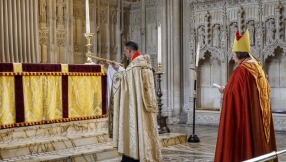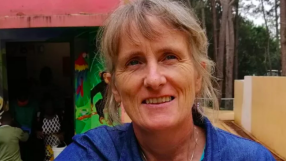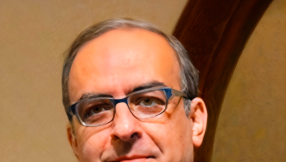
Churches are doing an enormous amount to welcome people new to this country and to enable them to integrate. But how do we know that when we don’t read about it in the media? That’s where Theos comes in with groundbreaking research that the government is reading right now.
Theos is a London-based think tank that explores the role of Christianity in public life, and it's part of the Bible Society family. Theos sent a researcher, George Lapshynov, across the country to visit all kinds of different churches, finding out what they're doing with refugees and whether what we hear in the media is true.
You too can read the results of this unique project in the report From Strangers to Neighbours: The Church and the Integration of Refugees. This is the first substantial report of its kind, revealing that churches are not only welcoming people new to this country but helping them integrate into British life and become a blessing to the communities they’ve arrived in.
The media is wrong about the Church
‘Churches have been vilified in the media, repeatedly, over many years,’ says George, explaining his personal motivation for starting this project. ‘I knew, anecdotally, that the Church was doing good things, welcoming all kinds of asylum seekers and refugees, Christian or not. But there was no research into this.
‘There are church leaders working overtime trying to help individual asylum seekers, taking them to appointments. I started volunteering in welcome centres, through my church, in 2022 when the wave of Ukrainians arrived, because I speak Ukrainian.’
George’s church in London is Russian, but with people escaping war, half the congregation is now Ukrainian. So his church has become a place where Ukrainians and Russians worship God together and pray constantly for peace.
‘The Homes for Ukraine scheme was set up through Christians,’ George says. ‘Krish Kandiah pitched it to the government and called every person he knew in every church in the UK to try to get 10,000 people to offer a home to a Ukrainian refugee, and within 24 hours he had 20,000.’
Parliament echoed the media
Where is that great work of churches in the media? George started work just after the Bishop of Chelmsford, Guli Francis-Dehqani, was called by Parliament to give evidence to the Home Affairs Select Committee. Bishop Guli, who was born in Iran and escaped persecution there as a teenager, told the Church Times afterwards: ‘It felt like an imbalanced panel: and it felt like they had come with their minds made up, wanting to attack and trip up the Church of England.’
At this stage, the feeling in politics was the same as in the media. Bishop Guli said further: ‘I have a concern that all this negative rhetoric – which is not based, much of it, on a great deal of credible evidence – is going to be damaging to the life of some of our faithful church communities, who are trying to offer support and pastoral care to really vulnerable people.’
It was a confusing situation with two contradictory abuses allegedly taking place on an extremely wide scale. The media talked about the Church taking advantage of vulnerable refugees, pressuring them to convert, while at the same time claiming asylum seekers were abusing the welcome of churches to obtain their permission to stay in the country.
‘There was no evidence of this,’ George says, ‘but all the big newspapers, even the ones I thought might be more sympathetic to the Church, were very vocal about it. The BBC’s reporting also seemed quite biased against the Church.’
Finding the evidence was a huge struggle
In fact, the evidence supported the Church and its amazing work – it would just prove very difficult to get hold of. Nobody had managed to put it together before Theos sent George out to do it, and it looked for a while as if George might not be able to either. The damage that Bishop Guli had warned was being done to church communities made it very difficult for George to find anyone in the Church willing to talk about their work with asylum seekers.
‘I was getting a bit nervous,’ he says. ‘Church leaders went into hiding. They’d say, “We refuse interviews. We refuse to let journalists on the church premises.” They wouldn’t even talk to Theos, despite Theos being a friendly figure.’
George struggled through the summer of last year, eventually by the end of it getting senior leaders in various denominations to persuade local church leaders that it would be worth contributing to this research by Theos. Then he travelled to places like Cardiff, Liverpool and Glasgow, not just to interview pastors but to see and participate in the work of churches welcoming, serving and helping to integrate refugees.
The publication of the report was partly funded by the MB Reckitt trust and the Susanna Wesley foundation, but the research itself wasn’t funded. There was no travel budget. ‘I used my own church network,’ George says, ‘and it turns out that through friends or acquaintances of friends I knew someone in every city in the UK who was willing to accommodate me.
‘I stayed once with a friend but all the other times it was people I didn’t know personally. I had never met them before and there they were welcoming me, feeding me, housing me for a week at a time. It was quite humbling to be in this vulnerable position of being welcomed. I wouldn’t stretch it as far as to say I was like an asylum seeker myself, but in the acknowledgements in the report I thanked all those people, and I wrote, “because I was a stranger and you took me in”.’
The truth is the Church enables integration
What George discovered, and what you’ll read about in the report, is that the work of churches with new arrivals goes much further than the welcome, and it certainly isn’t a conveyor belt to refugee status as is sometimes alleged. It’s true that Christians welcome strangers as a sort of love reaction, commanded by Scripture and enabled by the Holy Spirit. And of course they go further than that, recognising as Jesus taught that the foreigner in need is their neighbour. But fundamental to all of this is a recognition of the need to help refugees integrate into British society.
‘It was even better than I expected,’ George says. ‘I thought churches offered a nice environment with a tea and biscuits, maybe some social services like a food bank. But in pretty much every church I visited, people were working very productively towards integration.
‘And I expected it to be the more historically British churches who were good at integration. Diaspora churches, I thought, might not be so good at that because they tend to create enclaves. But I was surprised to find that they are really, really good at integrating. The Chinese and Ukrainian and Coptic churches I visited in the UK are making extra conscious efforts to be useful in their cities and positive assets to society.
‘I saw asylum seekers who were really feeling part of the community, feeling like they were at home here, which made them want to be British, it made them want to be useful to British society. Their churches were encouraging them to volunteer, to improve their English skills. Churches are creating opportunities for asylum seekers to meet local people, because otherwise they sit in a hotel for years with very, very few opportunities to interact positively with locals.’
Churches are unique because they welcome and support refugees without formally being a charity (even if they have charitable arms like food and clothing banks). An asylum seeker attends a church service like any other member of the church. They don’t come as the one in need, the beneficiary, to be served by the ordinary members of the church as benefactors.
‘In many of the churches,’ George says, ‘asylum seekers were giving to the church members. They were cooking for them, painting walls or doing gardening on their own initiative because they wanted to say thank you to the church community. Church leaders and church members told me that they were actually uncomfortable about this because it reversed the roles. If you are an asylum seeker, there are virtually no settings in society where you can do this, where you are in the position to offer something to someone.’
Politicians now have the evidence
George spent months visiting churches to see the work in action and then months more writing it all down. The work was reviewed by colleagues at Theos and by academics externally. Although intended for publication earlier in the spring, it wasn’t ready until June, when Refugee Week happens to fall. So the timing in the end was perfect. ‘It was God-ordained,’ George said.
‘We launched the report in Parliament with the help of the Woolf Institute. We had Bishop Guli, who sits in the House of Lords, as well as academics, charities like Welcome Churches, and representatives of Reform Judaism. The Ministry for Housing, Communities and Local Government, which plays a key role in resettling, housing and integrating refugees were very interested.
‘The Minister for Faith, Communities and Resettlement, Lord Khan, was pretty chuffed. One of his senior advisers told me this is the exact piece of research they were waiting for in order to allow the faith team within the Ministry for Housing, Communities and Local Government to work more closely with the refugee resettlement team. This is the evidence they needed to include a faith element within the resettlement work.’
But there’s been no interest from the media. ‘We contacted all the major news outlets and nobody was interested. But, despite not getting widespread interest, we were successful speaking to the right people in Parliament, in the Government. This is a very good opportunity for the Government to work positively with churches, and they seem to be seizing it.’
George will have another opportunity to speak with a minister in autumn when he attends a roundtable chaired by Dame Angela Eagle, the Minister of State for Border Security and Asylum. He hopes the report will inspire a change in government policy enabling better integration and recognising the role of churches. He also wants to encourage more collaboration between churches and refugee charities, which have tended to avoid churches despite the amazing extent of their work.
Why is integration so important?
George says: ‘If you only start to make people part of British society when they’ve spent years in a hotel, that’s too late. You’ve missed those crucial early years.
‘Imagine you are an asylum seeker. You arrive in the UK, you get put into a hotel and you are underfed. I spoke to asylum seekers who have diagnoses of malnutrition. They were better fed in Eritrea! They were malnourished, they had mould in their food. Because of a paperwork error, they did not have access to their subsistence money so they couldn’t even take the bus anywhere.
‘And that is your first impression of everything. You’ve spent years living in a hotel, not really meeting anyone, not learning English because the waiting lists are incredibly long for the English classes. When you eventually get leave to remain, you get kicked out into society, you become homeless, jobless, and that is your impression of Britain. So we need to work very early, not just on teaching them through a class what are British values, but enabling them to interact with local people.’
That’s what the Church has been doing. Will you pray that this report inspires a constructive change in policy and encourages refugee charities to work closely with churches to increase their impact?
You can find out more here about Bible Society's Refugee Appeal.
James Howard-Smith is a writer for Bible Society.













